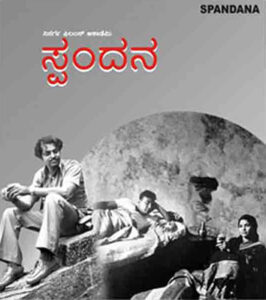Spandana (1978)
Directed by PN Srinivas
A retro-gaze review on a classic by Sharath Bhagavan
As a filmmaker, there’s no greater pleasure than discovering a cinematic gem from your own backyard that you want to tell the whole world about. When my writer friend Ved Iyer spoke highly of this film, I was immediately intrigued—not least because I hadn’t heard of it. I have to thank him for persuading me to watch this masterpiece: 1978’s Spandana, by PN Srinivas. A true-blue break-out film, this must surely be one of the cornerstones of the ‘art’ or ‘parallel’ cinema wave that swept Indian films in the ’60s and ’70s, but sadly one that not too many people know about.

Eschewing bombastic scenes or over-the-top characters, it is remarkable how PN Srinivas channels a simple story of simple people in a simple—if difficult—situation, and effortlessly makes the whole transcend the sum of its quotidian parts. If anything, its ‘slice-of-life’ approach is reminiscent of the warmth of a Truffaut or De Sica, the gentility of a Renoir, while the simmering tensions and middle-class worries bubbling in the background, always threatening to erupt, find resonance with the hidden angers that fuelled the masterpieces of Ken Loach and Mike Leigh, who pioneered the ‘kitchen-sink realism’ of the 1970s.
Definitely to be commended is the film’s bold—sadly, even for today—stance of depicting a truly wrenching story that intertwines a woman’s wants and (yes) desires with the infidelity, derision and sidelining she faces in everyday life. Perhaps the most upsetting facet is that you can watch the film today and still feel like nothing has changed in our society. The most commendable aspect, however, is Srinivas’ unparalleled ability to strip the story of sanctimony, deciding to merely sit back and watch the story unfold without overt exposition or, even, a resounding ending with the mandatory comeuppance and moral grandstanding. His graceful and subtle use of flashbacks, flawlessly executed, allow us to slowly widen our gaze even as the plot ostensibly trundles forward like the rickety tour bus the main characters are travelling on for a small holiday. And what a set of characters! Each one is deftly composed in a few strokes, but lingers indelibly in the mind. I particularly love the innovation Srinivas employs when one of the characters ‘converses’ with a deaf-mute child—stirringly, it is this that sets up the conflict that will simmer beneath the surface of the film until it explodes in one of the most brazenly underplayed denouements I can recall.
The stunning grandeur of Karnataka’s tourist attractions form a beguilingly attractive backdrop for this truly modern tale. Unassuming visuals by the ace cameraman BC Gowrishankar reveal the beauty of nature while subtly juxtaposing it against the harshness of human nature—without, again, making too fine a point of it. After all, like they say, the best camerawork and direction should be invisible. And this film achieves it. In spades.
Rounding out the mood is the pitch-perfect background score and beautifully timed ageless songs by CR Ashwath, who is in top form here. ‘Entha marulayya idu’ by the late great SPB and ‘Bande baruthaava kaala’ by the ever-amazing P. Susheela make you long for that bygone era of golden period of Kannada cinema. The lyrics, by famed poet Lakshminarayana Bhat, are perfection (and I have a sneaking feeling he probably had a hand in the free-form poetry one of the most memorable characters in the film is fond of spouting—my favourite would probably be the one he humbly calls ‘Upma’).
At the heart of the film is a woman (brilliant Aparna Narang) who is the second wife of a classic middle-class workaholic ( Krishnaraj, who also is the producer of the movie ). All she craves are the simple joys of life: going out with the family to watch a film or eat in a restaurant. These, however, are of no concern to her patriarchal husband. His sole focus is on earning enough to get his child—the deaf-mute-girl (played by Kumari Revathi)—married. We see an unprecedented streak of defiance when she steals money from his wallet right at the start. And for what? So she can go and enjoy a good kesari bath by herself at a restaurant. The scene, with this subdued beauty savouring her meal surrounded by men, speaks volumes without a single word. It sets us up for heartbreak when she befriends a charming man (PN Srinivas himself)—who may have known her in college, and is shocked at how she has turned out compared to his memories of her—on the central bus journey. Absolutely powerful social commentary, supported by brilliant writing (story and screenplay by the auteur director) and acting.
Will she break out of her stifling morass of a life? Can a woman like her even dare to seek ‘more’? What lies at the heart of friendship and love, and doesn’t everyone deserve some in their lives? But at what cost? These are the hefty questions this bold little film easily bears. The films trenchant climax takes place against the thundering Jog Falls—long before the blockbuster hit Mungaaru Male reintroduced it into modern film jargon—pitting the brutal force of nature against the unassailable wants of human desire.
Remarkably, the film never takes sides, instead letting the story play out to its inevitable, nail-biting finish, evoking sympathy while never passing a moral judgement. That’s what makes Spandana a film that was and still probably is way ahead of its time, not only for its sensitive handling of the subject matter, but also for its impeccable command over cinematic grammar, screenwriting (particularly the minimalist dialogues) and the nuances of visual storytelling.
Wherever you are, PN Srinivas, I am honoured to have been given the opportunity to experience this film. In me you have a passionate and earnest fan. Long life to you, Sir!
